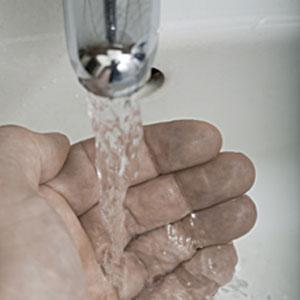
This is the VOA Special English Health Report.
Automatic faucets use an electronic sensor to start and stop the flow of water when people wash their hands. These faucets save a lot of water, which is one reason they are found in busy public bathrooms. Another reason is because of concerns about the spread of infection by people touching the handles on traditional faucets.
Hospitals started using automatic faucets about ten years ago. But a new study at one hospital finds that these devices may not always be worth the savings in water use.
Researcher took apart 20 automatic faucets at Johns Hopkins Hospital in Baltimore, Maryland. They found that half contained Legionella bacteria, compared to 15 percent of manual faucets.
Healthy people rarely get sick from the bacteria. So the study should not concern most users of automatic faucets in public bathrooms.
But Legionella bacteria can cause a form of pneumonia in people with weakened immune systems. These include patients with diseases like cancer and HIV/AIDS, and those who have recently had an organ transplant.
After their first tests, the researchers cleaned the water system with chlorine dioxide. But they found that 29 percent of the automatic faucets were still contaminated with bacteria. That compared to seven percent of the manual faucets.
The researchers have some theories. Dr. Emily Sydnor says the automatic faucets contain more parts, so there are more areas where bacteria could grow. Also, the reduced water pressure in low-flow faucets might not remove as much bacteria from surfaces.
EMILY SYDNOR: "We think that, one, the pieces and the parts inside are sort of providing places and surface area for bacteria to get trapped and probably promoting something called bio-film formation, which is essentially just a colony of bacteria that can sort of coexist in a little slime and a little, almost a little colony of it that it's hard to get rid of. And that, combined with the low water flow, is probably promoting the growth."
Six other studies have also found higher amounts of bacteria in automatic faucets. The latest study was presented Saturday at a meeting of the Society for Health Care Epidemiology in Dallas, Texas.
The study has not yet been published. But the results have persuaded Johns Hopkins Hospital to replace its automatic faucets with manual ones.
The Chicago Faucet Company supplies the hospital with automatic and manual faucets. Patrick Kimener, the senior vice president of sales, said he had not seen the full study.
PATRICK KIMENER: "Our company has been around for 110 years. We've been a long-term supplier for an awful lot of health care facilities in the US and we're more than interested to find out what those findings would be."
And that's the VOA Special English Health Report available on your computer or your mobile device at voaspecialenglish.com. I'm Christopher Cruise.
Legionella: the bacterium that causes legionnaires' disease, flourishing in air conditioning and central heating systems 軍團(tuán)菌
Doctors lack many ways to treat radiation exposure
Breast cancer study could change how early growths are treated
Nuclear crisis in Japan raises worries about radiation risks
After brain study, new questions about mobile phones
(來源:VOA 編輯:崔旭燕)
